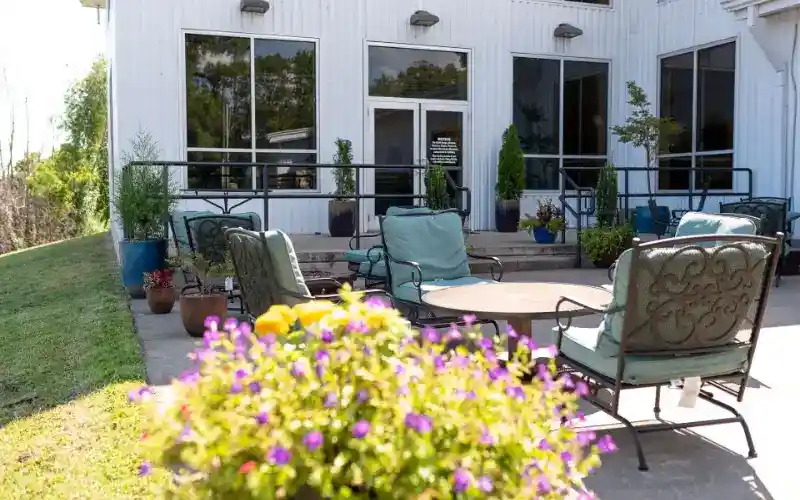







Choosing the right rehab center in Arkansas can be a daunting task. With so many rehabs in Arkansas available, how can you be sure you’re making the best decision for yourself or a loved one? In this comprehensive guide, we’ll provide insights to help you navigate the world of drug and alcohol rehab in Arkansas, from understanding different rehab settings and available treatment services to evaluating trust factors and payment options. You’ll also learn about the benefits of long-term inpatient drug rehab, local resources for addiction recovery support, and inspiring success stories from rehabs in Arkansas. So let’s dive in and start your journey to recovery.

In Arkansas, the most highly regarded drug rehab centers offer a wide range of treatment services, payment options, and trust factors to cater to individual needs and preferences. A careful exploration of these aspects will empower you to select the most suitable rehab center for your needs or those of a loved one.
We will examine the variety of rehab settings, an array of treatment services, trust factors, and different payment options accessible in Arkansas.
Arkansas offers various drug and alcohol rehab settings for treating drug and alcohol addiction, including:
Selecting a rehabilitation center in Arkansas requires careful consideration of trust factors and accreditations. These include the Gold Seal of Approval from the Joint Commission for addiction services, CARF Accreditation, and verification by SAMHSA. These factors ensure that the rehab center adheres to the highest standards of care and treatment.
CARF accreditation is a highly regarded trust factor for rehab centers, demonstrating that they meet international standards of quality. Additionally, the qualifications and experience of medical staff at rehab centers play a significant role in the success of your treatment.
Taking these trust factors and accreditations into account will enable you to make a well-informed decision when choosing the optimal rehab center in Arkansas for you or a loved one.

The cost of rehab in Arkansas can vary depending on factors such as the type of program, duration of treatment, and insurance coverage. Fortunately, various payment options are available for rehab centers in Arkansas, including insurance coverage, Medicaid, and self-payment. Insurance providers such as Arkansas Blue Cross Blue Shield, Cigna Arkansas, and Ambetter may cover all or part of the cost of rehab treatment.
For uninsured individuals, sliding scale payment plans are available based on income. Additionally, Medicaid provides coverage for certain mental health services, such as opioid abuse treatment, for eligible individuals. The mental health services administration plays a crucial role in ensuring access to these essential services.
Understanding the available payment options and working with your chosen rehab center to determine the best approach for your financial situation can help make the process of accessing treatment more manageable.
Long-term inpatient drug rehab programs in Arkansas offer numerous advantages for those seeking help with addiction. These programs provide:
Long-term treatment is the most effective way to achieve drug and alcohol rehabilitation. By committing to a long-term inpatient program, individuals can benefit from the structured environment, ongoing support, and comprehensive care that is essential for lasting recovery.

Navigating insurance and payment options for rehab in Arkansas can be overwhelming, but understanding the available resources can make the process more manageable. In Arkansas, insurance coverage for rehab treatment may be provided by Arkansas Blue Cross Blue Shield, Cigna Arkansas, and Ambetter. These insurance providers may cover all or part of the cost of rehab treatment.
In addition to insurance coverage, Medicaid is available for individuals who meet certain eligibility requirements, and may cover inpatient and outpatient treatment, as well as medication-assisted treatment. For those without insurance, sliding scale fees and payment plans may be available.
Exploration of these options can help individuals identify the payment solution that best fits their financial needs for rehab treatment in Arkansas.
The prevalence of drug and alcohol addiction in Arkansas is concerning, with amphetamines and opiates being the most frequently reported substances of abuse. Furthermore, drug overdose death rates in the state have risen from 12.6 per 100,000 in 2011 to 22.3 per 100,000 in 2021, with 628 drug overdose deaths recorded in 2021 alone.
These alarming statistics highlight the urgent need for effective treatment programs in Arkansas. In March 2019, a single-day count of individuals enrolled in substance use treatment in Arkansas reached 7,640. With the right resources and support, individuals struggling with addiction can find the help they need to overcome their substance use disorders and lead healthier, more fulfilling lives.
Several factors warrant consideration when assessing the quality of Arkansas drug treatment programs. Compliance with licensure standards set by the Arkansas Department of Human Services (DHS) ensures that the program meets the requirements for providing quality care and services. Additionally, the reporting of client-related data, such as treatment outcomes and demographics, can provide valuable insights into the effectiveness of the program.
Accreditation and certification are also essential factors to consider when evaluating the quality of a drug treatment program in Arkansas. Ensure the rehabilitation center is accredited by the Joint Commission and has the necessary certifications. Taking these factors into account allows individuals to make a well-informed decision when choosing a high-quality rehab program that meets their needs.
Local resources in Arkansas play a crucial role in providing support during and after addiction treatment. Some of these resources include:
These support groups offer a safe space for individuals in recovery to share their experiences and receive guidance from others who have faced similar challenges.
Community organizations, including faith-based organizations and non-profit organizations such as the Arkansas Recovery Network and the Arkansas Council on Alcoholism and Drug Abuse, provide additional resources and support for those seeking help with addiction recovery. Connecting with these local resources provides individuals with continued support and motivation throughout their recovery journey.
Selecting the right rehab center in Arkansas involves considering your unique medical needs and preferences. Research the qualifications, experience, and credentials of licensed medical practitioners at each rehab center to ensure they can provide the necessary care and support. Additionally, consider a range of treatment plans, including inpatient, outpatient, and residential programs.
When evaluating accreditation and certification, make sure the rehabilitation center is accredited by the Joint Commission and has the necessary certifications. Taking these factors into account will lead you to a well-informed decision when selecting the most suitable rehab center in Arkansas for you or a loved one.

Arkansas offers a variety of specialized rehab programs tailored to specific needs and preferences. These programs include treatment options for alcohol and drug addiction, mental health and addiction services, and 12-Step based treatment. Exploration of these specialized programs enables individuals to find the treatment plan that best caters to their unique situation.
In addition to traditional treatment options, Arkansas provides resources such as liveanotherday.org, rehabs.com, and rcofa.org, which offer information on inpatient, outpatient, and detox programs. By researching these specialized rehab programs, individuals can find the best-fit treatment option to address their specific needs and support their journey to recovery.
In summary, finding the right rehab center in Arkansas involves considering various factors, such as rehab settings, treatment services, trust factors, payment options, and the quality of treatment programs. By exploring local resources and understanding the benefits of long-term inpatient drug rehab, individuals can make an informed decision when selecting the best rehab center for their needs. With the right support and resources, recovery from addiction is possible, and lasting success can be achieved.
In Arkansas, individuals have access to a range of rehab settings, including inpatient, outpatient, residential, and partial hospitalization programs.
Arkansas Rehabilitation Services and Arkansas Peer Recovery have both enabled individuals to reach successful milestones in their recoveries. The programs have provided comprehensive support and guidance to those in need.
When selecting a rehab center in Arkansas, look for trustworthy factors such as CARF accreditation, the Joint Commission’s Gold Seal of Approval, and medical staff credentials.
Payment options for rehab centers in Arkansas include insurance coverage, Medicaid, and self-payment.
Yes, Arkansas offers a range of specialized rehab programs tailored to meet specific needs, such as those for alcohol and drug addiction, mental health and addiction services, and 12-Step based treatment.